Tuesday Mar 03, 2026
Tuesday Mar 03, 2026
Saturday, 18 March 2023 00:00 - - {{hitsCtrl.values.hits}}
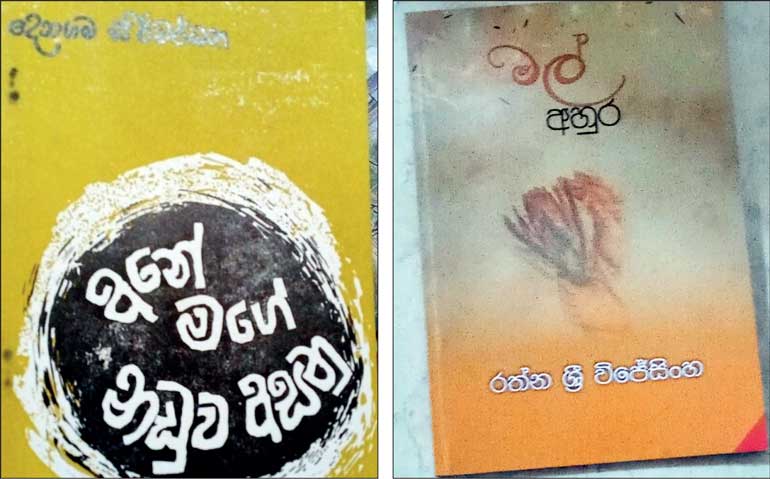
By Surya Vishwa
Poetry could be described as the intersection between the tear and the smile, the juncture where life meets its reflective shadow and speaks in the dialect of the heart. True to the spirit of the Harmony page we dedicate this edition to the commemoration of World Poetry Day which falls on 21 March. We will discuss a few poems from the international realm and especially from Sri Lanka, featuring the concept of Thribasha – celebrating Sinhalese, Tamil and English poetry and the writers who write them.
Poetry is by itself a historical narrative from which we can learn about a nation, its spirituality and the lives of the people who live/d in it. Thus, poetry becomes the ever living pulse of a country. The ancient civilisation of Sri Lanka is a poetic testimony by itself which thrived in the medieval tradition of poetic letters – Sandeshiya Kavi sangraha such as the Hansa Sandeshiya, (messages of the swan) Salalihini Sandeshaya and the Gira Sandeshiya (messages of the myna) and those such as Amavatura, Pujavaliya and the Saddharma Ratnavaliya which give insight into the geography, traditions, policies, devoutness and overall way of life of the particular era.
Similarly in the Sinhala and Tamil language ola leaf manuscripts – whether the content is on ceremonies and traditions, astrology, medicine, farming or culinary knowledge, much of it was passed on in the poetic form, at times in a complex and coded manner.
All this show us that poetry is much more than lyrical language but rather the sinews that bind one human being to another and a nation to the world.
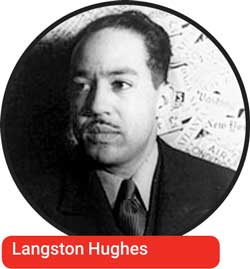 Poetry is also a weapon. It is the blade that opens up public consciousness. It is also the ladder that can breach the high walls of tyranny and help to shape policies that return to people their dignity.
Poetry is also a weapon. It is the blade that opens up public consciousness. It is also the ladder that can breach the high walls of tyranny and help to shape policies that return to people their dignity.
From the poetry of those such as Langston Hughes and Countee Cullen of the Harlem Renaissance which led to the Civil Rights movement in the early 20th century in the United States and the poetry of women such as Sylvia Plath which started off the feminist movement as well as the contemporary poetry of spiritual masters like the Vietnamese Buddhist monk Thich Nhat Hanh – we are being told – if we care to listen, that all of life is an unfolding poem.
Let us begin listening with the following poem, the title of which is ‘Call me by my true names’ by Ven. Thich Nhat Han.
Do not say that I’ll depart tomorrow
because even today I still arrive.
Look deeply: I arrive in every second
to be a bud on a spring branch,
to be a tiny bird, with wings still fragile,
learning to sing in my new nest,
to be a caterpillar in the heart of a flower,
to be a jewel hiding itself in a stone.
I still arrive, in order to laugh and to cry,
in order to fear and to hope.
The rhythm of my heart is the birth and
death of all that are alive.
I am the mayfly metamorphosing on the surface of the river,
and I am the bird which, when spring comes, arrives in time
to eat the mayfly.
 I am the frog swimming happily in the clear pond,
I am the frog swimming happily in the clear pond,
and I am also the grass-snake who, approaching in silence,
feeds itself on the frog.
I am the child in Uganda, all skin and bones,
my legs as thin as bamboo sticks,
and I am the arms merchant, selling deadly weapons to Uganda.
I am the twelve-year-old girl, refugee on a small boat,
who throws herself into the ocean after being raped by a sea pirate,
and I am the pirate, my heart not yet capable of seeing and loving.
I am a member of the politburo, with plenty of power in my hands,
and I am the man who has to pay his “debt of blood” to, my people,
dying slowly in a forced labor camp.
My joy is like spring, so warm it makes flowers bloom in all walks of life.
My pain is like a river of tears, so full it fills the four oceans.
Please call me by my true names,
so I can hear all my cries and laughs at once,
so I can see that my joy and pain are one.
Please call me by my true names,
so I can wake up,
and so the door of my heart can be left open,
the door of compassion.
This is the epitome of a poem that speaks of the wisdom of loving kindness amidst the worst of atrocities where one could see within oneself and others the hidden or un-awakened good. Here the entire life process within and beyond each birth cycle is metaphorically presented as a seamless evolution process in which we could awaken the compassion in each of us.
Let us now listen to the poetic cry for justice by Langston Hughes, the novelist, playwright and poet who was a pioneer of the Harlem Renaissance that created the literary foundation for the emergence of the Civil Rights Movement. This poem is titled ‘Justice’.
That Justice is a blind goddess
Is a thing to which we black are wise:
Her bandage hides two festering sores
That once perhaps were eyes
Wherever we are in the world, we can resonate with these four lines as we find justice to be elusive and shrouded in power, hypocrisy or manipulation.
Let us now look at a poem written in the early 1970s by Denagama Siriwardena in his first poetry collection titled after one of the poems in the book; ‘Aney Mage Nadu Asanu’ (which can be translated as ‘Oh heed my call for justice’). Below is the translation of this poem.
 To the house of a man
To the house of a man
Who travels in a Benz car
Went my sister
Like a little flower bud
A long time thereafter
Carrying a blossom
She returned to the village
Crushed and wilted
Like a faded flower
Against the Benz car owner
Father filed legal action
Another man
Who also travels in a Benz car
Judged this case
Father, who lost this lawsuit
Now narrates it
To all, on the highroads
Father
There is still no power
Vested on those who walk
To mete out justice
As in the poem by Langston Hughes we see here too how the poet sees what we refer to as justice as played out in different dimensions of society. While in the case of Hughes it was reflective of power tinted by racial superiority and division, in the case of the poem by Siriwardena it is about the utopian notion of justice when faced with class and wealth based boundaries. He shows in the poem how this nullifies the presumption of equality and makes Justice a redundant entity.
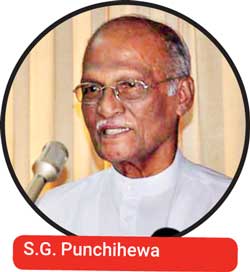 We now look at a poem from the collection Thisahamige Kavi (poems of the oral tradition composed by Thisahamy), the Veddha chief of Sri Lanka, by S.G. Punchihewa. Punchihewa, like Denagama Siriwardena is a veteran poet and literary figure writing in the Sinhala language for around six decades. It should be mentioned here that S.G. Punchihewa celebrated his 90th birthday on 15 March amidst a special literary event organised to commemorate a lifetime in the printed world thus far. This book, published in 2013, was amongst the work that were showcased at the event and is about the orally passed down sung poems by the Sri Lankan aborigine Veddha leader Thisahamy who died in 1953 (not to be confused with the subsequent Veddha leader and others under this name). As pointed out by S.G. Punchihewa, the life story of Thissahamy was featured in the book Savage sanctuary by R.L. Spittel and the poems of this book is from the hundreds of poems Thisahamy composed and sung out, describing diverse situations of his life including his ousting from the village. These poems are those instilled in the memory of his son Tikiri Wanniya and selected by S.G. Punchihewa for the book.
We now look at a poem from the collection Thisahamige Kavi (poems of the oral tradition composed by Thisahamy), the Veddha chief of Sri Lanka, by S.G. Punchihewa. Punchihewa, like Denagama Siriwardena is a veteran poet and literary figure writing in the Sinhala language for around six decades. It should be mentioned here that S.G. Punchihewa celebrated his 90th birthday on 15 March amidst a special literary event organised to commemorate a lifetime in the printed world thus far. This book, published in 2013, was amongst the work that were showcased at the event and is about the orally passed down sung poems by the Sri Lankan aborigine Veddha leader Thisahamy who died in 1953 (not to be confused with the subsequent Veddha leader and others under this name). As pointed out by S.G. Punchihewa, the life story of Thissahamy was featured in the book Savage sanctuary by R.L. Spittel and the poems of this book is from the hundreds of poems Thisahamy composed and sung out, describing diverse situations of his life including his ousting from the village. These poems are those instilled in the memory of his son Tikiri Wanniya and selected by S.G. Punchihewa for the book.
Below is a poem about treatment for snakebites which Thisahamy was said to have been proficient in.
We obtain medicinal treatment
Of the expertise perfected
In practice as seen
We seek out the mantras
The Anjanam, the auspicious smoke
Reptilian anger selects the fatal point
S.G. Punchihewa points out in describing this poem that the Veddhas believed that if a snake stings in wrath, that the poison of that anger is so vicious that no amount of treatment could save the patient. It is believed that a snakebite devoid of wrath or viciousness can be treated and the poison removed from the body.
This brings us to the understanding of the poison that the emotion anger contains, whether it is in the form of a snakebite or emanating as a sting in the human heart as dweshaya (resentment).
We now look at the poetry of Ratnashri Wijesinghe whose poetic works include the books Suba Udesana (auspicious morning), Mal Ahura (bouquet of flowers), Wassanen Pasuwa (after the rain), Suwanda Muwadara (the hovering scent) and Sandagiri Pamula (feet of the rock).
We have selected the poem Sigiri Apsarawa Kendang Ennada (Shall I bring home a Sigiri damsel – of the frescos fame) from his book Mal Ahura.
I seek permission mother
To bring home
A Sigiri damsel
The Poya moon
Has also come to the village
To leave
I seek your permission mother
She has lineage to royalty
From both parents
Her chastity
Is as pure as borne from flowers
In delicate beauty
She is a true goddess
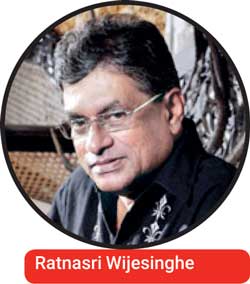 In this book Ratnasri Wijesinghe does what few poets do – give the background analysis of the poem as well as the event from which the inspiration to write it sprang up. It is thus described that this poem is based on the very commonly seen parental opposition to marriage based on class, caste, ethnicity or other friction which much family based social opinions are formed. It is stated by the author that this poem was inspired by the cynical response an unmarried friend gave his parents (who had opposed all his choices) when they inquired from their ageing bachelor son as to when he would marry. This poem has been put into music by H.M. Jayawardena and sung by Asanga Priyamantha Peiris.
In this book Ratnasri Wijesinghe does what few poets do – give the background analysis of the poem as well as the event from which the inspiration to write it sprang up. It is thus described that this poem is based on the very commonly seen parental opposition to marriage based on class, caste, ethnicity or other friction which much family based social opinions are formed. It is stated by the author that this poem was inspired by the cynical response an unmarried friend gave his parents (who had opposed all his choices) when they inquired from their ageing bachelor son as to when he would marry. This poem has been put into music by H.M. Jayawardena and sung by Asanga Priyamantha Peiris.
We now feature the poetry of a young poet, Nayomi Amarasinghe, member of the Kalutara Writers’ Association. This poem is part of an unpublished collection provided to the Harmony page for this edition. These poems are written similar to the Haiku tradition. The writer is in the process of attempting to publish her poetry in book form and what has stopped her so far is the difficulty in raising funds for it.
We have selected three such poems where the meaning and metaphor as well as nuances are self-explanatory.
The birds
In the pet shop
Can also feel the air
Look at this row of ants
How they greet
Without ending their journey
The sunrise and sun set
Is watched
Silently
By that mountain
We now feature the English poem ‘Thus I have heard’, from the book ‘Sedahamy Selvakumari and Others’ by Sakunthala Sachithanandan.
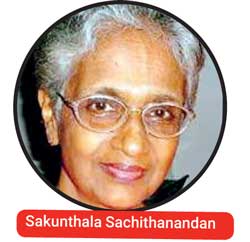 This craving for Merit, I heard on Poya day
This craving for Merit, I heard on Poya day
(and thus have I heard before)
Is part of the I and Me and My
And tainted with Self, at the core
Did that good deed go into my account of pin
Will it wipe out my load of meanness and sin
I’m planning My Program of Many Good Deeds
As I guess I will be soon going
Will this be your driving motivation
Hoping to get a Front seat in your new location
For your I and Me and My
If one could discern from an early age
That others felt the same hunger, fear and pain
As oneself and without thinking first
Of the Merit to be gained for oneself
One could be happy in other’s well being, give joy
That should be enough without plotting your ploys
Become aware, be wise, evolve
And as Khahil Gibran so wisely said
One should “be like the myrtle which perfumes the air
Unconsciously – without effort.”
And be kind and gentle because one just cannot help it.
To be continued next week
Sakunthala, a lawyer by profession and a veteran poet and children’s story writer throws light on the panic to do good that befalls on us when we near the end of our journey and we do not want to suffer wherever it is we may end up. She juxtaposes this craving to get pin for afterlife comfort, which in essence is selfish because it does not spring from acts of kindness to others as one would do for oneself but rather something that is done as yet another accumulation for one’s own benefit.
She quotes in the poem a line from the Lebanese origin poet Kahlil Gibran who was a stringent critic of the hypocrisy of early Christian Orthodoxy and wrote about idyllic humanistic and non-attached love that is notably described in his masterpiece ‘The Prophet’.
We now feature another poem by Sakunthala Sachithanandan from her book ‘On the Streets and Other Revelations’. This poem is titled ‘Riches’.
I sit, my many riches spread about me.
I glory in the feeling that we are millionaires, no less
So fortunate, so blessed
With so much, it makes me giddy to just glimpse
Under this very table, at my feet about a hundred
And there, under another, perhaps another hundred
Over there, again, they lie, about a hundred and fifty
I tremble in the knowledge that they are ours!
No common baubles these, although
In the sun they hung and swung
On the Karutha Colomban tree slowly ripening
Joyfully eaten, chewed up, dropped
By the hungry squirrels, birds and bats
To fall and rot, blue bottles all a-buzz!
Sometimes we will step on one
And to our unsuspecting toes
Would stick the golden, yellow, smelly pulp
Here they life in all their green gold glory!
Splendid, mute and plump, mat skinned and heavy
Their promise wafting up in their heady scent
Signaling what is yet to come – and then the skin
Peels off like strips of plastic to reveal
Swollen orange flesh with a myriad drains
Marking the route of the skin’s miniscule veins
A feast follows then – the first ecstatic bite
And the other, luscious morsels of delight
As often as we give away these treasures
To kith and kin and friends – this generous tree
Bears another load and yet again another,
Offering us its bounty for the season
The birds and bats and squirrels go on feasting
They’re hungry to be rich and so are we!
The poem details out the generous abundance of nature through the description of a Karutha Columbaan mango tree – the iconic mango variety of Jaffna – the North of Sri Lanka.
We now feature a poem from the collection ‘Rhythm of life’ by Psychiatrist and author Dr. Ruwan M. Jayatunga. This poem is titled ‘A Schizophrenic – Please don’t label me’.
My world is limited
Filled with wired sounds
I see Rocky Marciano
Fighting with Woody Allen
Long time ago
Aliens abducted me
They fixed wires into my brain
Then sucked out my brain substance
I cannot control my thoughts
Because thoughts control me
Some kind of energy is inside me
Giving continuous commands
I hate to go to the Bush House in London
Where the BBC transmits by thoughts
People often express amusement
When they read my thoughts
A man with a black jacket
Is an agent of the KGB
He is spying and trying to track me down
Maybe he wants to take me to Moscow
I was in Lubianka
As questioned by Lorenthy Beria
I was released by the NKVD
Then planted in Pennsylvania
When JFK was murdered
I knew the secret plot
No one took it seriously
Not even my psychiatrist
They called me a Schizophrenic
Branded me for the rest of my life
They said I could be a danger
Kept a watchful eye on me
Whatever I wore
I felt an invisible label behind my back
Probably it said
That I am a Schizophrenic
The poem is a sympathetic synopsis of how modern day clinical psychiatry may forever tarnish the future of a human being. It can motivate us to took deeply at how those of us who call ourselves sane – may be attitudinally imprisoning others in the jail of mental illness while not seeing our own aberrations.
We now feature a poem from the book Down Memory Lane by S. Pathmanathan (Sopa), one of the senior most poets from the North of Sri Lanka who at age 85 is still persistently pursuing his literary journey. The poetry is written in English and the book was launched last year. The poem we have selected is titled ‘Amma’s boys’.
It was a few weeks
after his wedding
Arul a was having breakfast
‘Egg isn’t properly fried!’
‘It is ok. I fried it myself’!
The new bride answered
‘Amma would do it better with just dry coconut leaves!’
‘I know you always prefer her delicacies!’
The focus of this dialogue was Periyamma
the eldest sister of my mother
Very traditional in her ways
skilled in maintaining the balance between salt and tamarind
She would do wonders with spices
a pinch of this
a pinch of that
Arul’s wife was reluctant to give in
‘Your people
add a lot of coconut milk
salt and tamarind!’
‘Essential ingredients, aren’t they?’
Arula vetoed her
Last month
my son was back home
He lives in Canada
with his wife and children
He’s in the kitchen
seated on the floor
relishing the kool
served by his mother
from the earthen pot!
I think wives have to put up
with the encomiums
their husbands shower
on their mothers
All husbands are amma’s boys
The poem is one among others through which the writer takes the reader through the path his birth and childhood trod upon and through the dialogues, hallways and occasional idiocracies of family and friends that we witness we can visualise a past that exists in the mind of the writer.
The book Down Memory Lane by S. Pathmanathan was translated into Sinhala under the direction of Professor of Athropology, Praneeth Abeysundara and featured as an online edition of the Jayawardenapura University Department of Anthropology website as a step to foster understanding between Sinhala and Tamil writers. The book was translated for the Jayewardenepura University by Kanishka Wijerathne, Daya Dissanayake and Oshada Abeysundara.
We now feature a poem by Cheran Rudhramoorthy, the expatriate Sri Lankan Tamil poet now living in Canada. A sociologist by profession Cheran was a journalist in Sri Lanka in the 1990s and has written much about the national misery of civil war and terror acts such as the burning of the Jaffna library.
A letter to a Sinhala friend (written in 1984)
It will not take many days
for you
and your friends
to recover from the shock
of meeting me, an ordinary man,
from an unseen and distant land
where, you had heard,
we sow lead-shots from guns
instead of seeds; a place
half full of two-storied houses,
half full of terrorists.
As we sat side by side
on the steps leading down
to the milky stretch of water
covered in glinting fine threads,
shreds of the moon’s curtain –
water that changed colour when its
muddy depths were stirred
and changed again with the shadows
of passing clouds –
my heart melted
when you sang a Sinhala song
in your sweet voice.
Once long ago –
I was a small boy then –
waiting at the Maho station
for the Batticaloa train,
I walked with my father for a while,
some distance along the railway lines.
Midnight.
The quiet sound of a lullaby
murmured through the wind.
The shock of that gentle sound
intercepting the baby’s cries
struck my heart that night
with sudden sadness.
Today too
I am enveloped by
a fine grief.
Did our different languages, after all,
put such distance between us
that we could not smile together,
nor savour
the beauty of falling ponnocchi flowers
blown down by the tumultuous Aadi winds,
nor those sudden moments of hesitation
when the long-tailed peacock
stopped and turned around in its stately walk?
I could not pluck for you
the single peacock feather you desired
nor, in the early hours of the night,
accompany you, as you wished,
across the moonlit grass
Your eyes could not hide
these small disappointments,
nor can I
forget your gentle affection.
We went our ways without maiming Nature,
leaving the flowers to blossom
and the grass to flourish
you to the south
and I to the north.
At daybreak, when
the cool breeze climbs down
from the huge trees
along the mountain ranges,
as you take your walk
brushing your teeth,
you will remember the days
when we worked together
excavating an ancient city at Maanthai,
and our brief friendship.
Tell your people
here, too, flowers bloom,
grass grows,
birds fly
As we read this poem we can keep in mind the context it was written in – the year the poem was written was cited as 1984 which marks the beginning of the unrest in the North that led to full-fledged armed conflict. While we may linguistically label or interpret in diverse ways the thirty years that followed, what remained at the core were dead bodies of human beings in their prime of youth. In between lay a chasm to be filled with understanding, empathy, caring and love. From 2009 we have had this chance and the biggest gift we could give each other being the gift of peace. Sri Lanka, a land in which Buddhism is enshrined, is a nation which can, each day, grow in discipline and kindness to give the world the message of peace.
The attempt of this edition of the Harmony page was to celebrate poetry – the language of the heart and although there were many other poets and poetry that we wanted to highlight, space limitation made us focus on a fragment instead. However, we will continue in this endeavour, especially through the Thribasha endeavour to promote translations and readings of literature in Sinhala, Tamil and English.